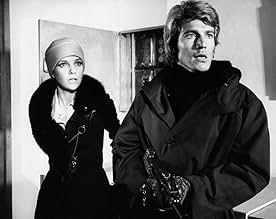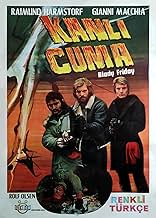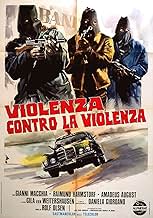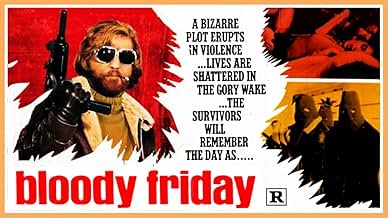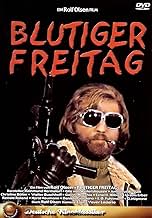Füge eine Handlung in deiner Sprache hinzuWhen terrorists rob a bank all hell is let loose.When terrorists rob a bank all hell is let loose.When terrorists rob a bank all hell is let loose.
- Regie
- Drehbuch
- Hauptbesetzung
Totò Mignone
- Franz Muhl
- (as Ottone Mignone)
Claudius Casagrande
- Niki
- (Nicht genannt)
Robert Furch
- Mann im Justizpalast
- (Nicht genannt)
Karin Glier
- Nickys Mutter
- (Nicht genannt)
Imo Heite
- Amerikanischer Soldat
- (Nicht genannt)
Empfohlene Bewertungen
This is a film about a bank robbery, with little concern for other's well being. The lead is a self centered egotistic homicidal maniac. He surrounds himself with people he can control. He has no respect for women. Lots of violence, some shooting & deaths, really low budget. There is a rather interesting sex scene where the lead & a consenting hostage have different views about sex, I thought it had a realistic ring to it. I rented this under the title Violent Offender. I thought that it was enjoyable if you can get past the low budget.
In this hard-boiled German-Italian production, Heinz Klett (Raimund Harmstorf), an anarchistic, mad-dog criminal, orchestrates a tricky escape from a Munich courthouse, right out from under the noses of police guards. With his gang -- Luigi (Gianni Macchia), Army deserter Christian (Amadeus August), and Christian's pregnant sister, Helen (Christine Böhm) -- Heinz next plans to rob the Deutsche Finanzbank so he can escape Germany and retire.
The heist is a bungled affair, as there isn't much money in the vault. But the robbers take ten hostages, including the heiress to a supermarket empire, and capitalize on the situation by demanding a million dollars in ransom and various modes of transportation out of the country. The police must contend with both the robbers and citizens who try to take over the investigation at every turn. In a marked contrast to how an American action film might depict a similar crisis, the cautious German constabulary readily accedes to all of Heinz's demands.
When Heinz and company receive the ransom money, they hijack a few of the hostages, including the heiress and a lesbian businesswoman who isn't impressed by Heinz's macho posturing. They get sidetracked to a country cabin, where the robbers' loyalties deteriorate. When a sympathetic Christian helps the heiress escape, she tips off the cops. Heinz rapes and murders the lesbian, while Luigi dies from an accidental gunshot wound. The cops surround the cabin and gun down Heinz, Christian, and Helen.
BLOODY FRIDAY is remarkable for not glamorizing its criminal protagonists, which was not the norm for crime movies of the late 60s and early 70s. It is only when the robbers are finally ambushed that director Rolf Olsen's staging makes a play for sympathy -- be they misguided youth or misunderstood human trash, did they deserve to die? Well, yes.
Olsen, who was more comfortable dabbling in lightweight sex films and mondo's, crams enough incident into the plot to keep our interest. The robbers' heist and subsequent flight from justice recalls every cliche in the book, but some scenes are remarkable -- the suspenseful escape from the courthouse; a toddler carrying a hand grenade outside the bank as if it were a toy; the massacre of the protagonists (equipped with extra large blood squibs); and a remarkably unpleasant rape scene, which is superimposed over slaughterhouse and, if you watch closely, hardcore sex footage.
Most of the cast underplays, which makes Harmstorf's intense performance as Heinz seem better than it is. However, his "Sea Wolf" is amusingly trashy, that of a cigar-chomping, machine gun wielding psychotic.
For those with a background in the social climate of 1972 Germany, one can discern the film's political subtext, with pointed references to Baader-Meinhof and the climate of social malaise that motivates the desperate thieves, as well as the ease with which they nab guns and start terrorizing the upper-class establishment.
The heist is a bungled affair, as there isn't much money in the vault. But the robbers take ten hostages, including the heiress to a supermarket empire, and capitalize on the situation by demanding a million dollars in ransom and various modes of transportation out of the country. The police must contend with both the robbers and citizens who try to take over the investigation at every turn. In a marked contrast to how an American action film might depict a similar crisis, the cautious German constabulary readily accedes to all of Heinz's demands.
When Heinz and company receive the ransom money, they hijack a few of the hostages, including the heiress and a lesbian businesswoman who isn't impressed by Heinz's macho posturing. They get sidetracked to a country cabin, where the robbers' loyalties deteriorate. When a sympathetic Christian helps the heiress escape, she tips off the cops. Heinz rapes and murders the lesbian, while Luigi dies from an accidental gunshot wound. The cops surround the cabin and gun down Heinz, Christian, and Helen.
BLOODY FRIDAY is remarkable for not glamorizing its criminal protagonists, which was not the norm for crime movies of the late 60s and early 70s. It is only when the robbers are finally ambushed that director Rolf Olsen's staging makes a play for sympathy -- be they misguided youth or misunderstood human trash, did they deserve to die? Well, yes.
Olsen, who was more comfortable dabbling in lightweight sex films and mondo's, crams enough incident into the plot to keep our interest. The robbers' heist and subsequent flight from justice recalls every cliche in the book, but some scenes are remarkable -- the suspenseful escape from the courthouse; a toddler carrying a hand grenade outside the bank as if it were a toy; the massacre of the protagonists (equipped with extra large blood squibs); and a remarkably unpleasant rape scene, which is superimposed over slaughterhouse and, if you watch closely, hardcore sex footage.
Most of the cast underplays, which makes Harmstorf's intense performance as Heinz seem better than it is. However, his "Sea Wolf" is amusingly trashy, that of a cigar-chomping, machine gun wielding psychotic.
For those with a background in the social climate of 1972 Germany, one can discern the film's political subtext, with pointed references to Baader-Meinhof and the climate of social malaise that motivates the desperate thieves, as well as the ease with which they nab guns and start terrorizing the upper-class establishment.
Excitingly shot against the undeniably picturesque backdrop of Bavaria, Germany, Rolf Olsen's schnapps-sharp 70s shoot 'em up, 'Blutiger Freitag (1972) (aka) 'Bloody Friday' is a bullet-shredded, blazingly brutal, Euro-crime classic! This bona fide, bloody-knuckled German icon of cult Grindhouse cinema benefits greatly from red-headed rapscallion, Raimund Harmstorf's super-masculine charisma, its appealing Munich exteriors, and suitably energized score. Olsen's grimy, full-throttle exploitation epic,'Blutiger Freitag' is certainly no less skull-rattling an experience than equally flint-edged poliziotteschi classics, 'Bloody Payroll', 'Violent Naples', 'Almost Human', and Michael Apted's vastly underappreciated Brit-crime masterpiece, 'The Squeeze'.
With its unleavened thuggery, exhilaratingly cavalier vehicular carnage, close quarters douchbaggery, and an unfiltered, genuinely terrifying performance from the muscular, enigmatic actor, Raimund Harmstorf; a force of corrupted nature, his bellicose, hugely misogynist misfit, Klett frequently indulges in bloody bouts of splenetic, bone-breaking violence; all the while cutting a darkly erotic dash in bespoke grungy, 1970s turtleneck sweater'd, leather-jacketed chic! 'Blutiger Freitag' is one of those rare 70s actioners that more than lives up to the fanboy hype, all its destructive Alpha energies resolutely undimmed! Throw in a sinuous crime-funk score from the estimable composer, Francesco 'New York Ripper' De Masi, and you have an all-time, Top Ten-list making, gun-happy Goliath of German grindhouse madness that deliriously delivers bravura, hard-boiled 70s skulduggery unlike any other German film from then, or now. Prost!!!!
With its unleavened thuggery, exhilaratingly cavalier vehicular carnage, close quarters douchbaggery, and an unfiltered, genuinely terrifying performance from the muscular, enigmatic actor, Raimund Harmstorf; a force of corrupted nature, his bellicose, hugely misogynist misfit, Klett frequently indulges in bloody bouts of splenetic, bone-breaking violence; all the while cutting a darkly erotic dash in bespoke grungy, 1970s turtleneck sweater'd, leather-jacketed chic! 'Blutiger Freitag' is one of those rare 70s actioners that more than lives up to the fanboy hype, all its destructive Alpha energies resolutely undimmed! Throw in a sinuous crime-funk score from the estimable composer, Francesco 'New York Ripper' De Masi, and you have an all-time, Top Ten-list making, gun-happy Goliath of German grindhouse madness that deliriously delivers bravura, hard-boiled 70s skulduggery unlike any other German film from then, or now. Prost!!!!
"Whatever they can do in Italy, we can do better" they must have thought in Germany. Extremely violent crime thrillers were very popular in Italy during the early 70's and at least a dozen of awesome ones got released every year. "Bloody Friday" is more or less Germany's response to this successful trend and a damn perplexing one, I may add! When the heavy criminal Heinz Klett escapes police custody during his transport to court, he promptly executes his plans to commit the biggest bank robbery ever in the history of the country. He, his regular partner and his girlfriend's brother storm into the bank heavily armed and take 10 people hostage. While the police attempts to gather the $1.000.000 ransom, and entire media circus unfolds outside on the streets. You usually know pretty much exactly how this kind of movie develops. Things don't go according to plan, there's the Stockholm Syndrome and a couple of unplanned deaths along the way. Apparently the film is inspired by similar real-life events as they occurred in Germany. I don't know which parts of the film were fictionalized, but I seriously wonder if the real events ended in such a nauseating and shocking bloodbath as well. I hope not. Probably the greatest accomplishment here is the biting social satire. While the hostage is going on inside, the public outside shouts for the re-implementation of the death penalty and there are even are some sly businessmen that unscrupulously want to make money out of the gathered crowd. It's certainly also not a film for people with an easily upset stomach or tangled nerves. Heinz' escape is bloody already and there's massively shocking sequence involving a hand grenade at the beginning of the hold-up. "Bloody Friday" is well-directed (by the guy who did "Shocking Asia"), the acting performances are pretty great and everything else (music, editing, photography, atmosphere) is simply in-your-face brutal and confronting.
If you consider the fact that the Italians, back in the seventies, were champions in the eurocrime exploitation genre (poliziotto), than it's no wonder they would have a go at it in other countries as well. Cineproduzione Daunia 70 (from Caliber 9) tried it in Germany with actor/director Rolf Olsen. He made the crime film Wenn es nacht wird auf der Reeperbahn in 1967, and the prostitution drama Der Pfarrer von St. Pauli in 1970, which are both quite good, so you understand why he wrote and directed it.
Bloody Friday is a more German version of the stylistic Italian poliziotto. It is tougher, more direct and also more over the top, I mean, it is sometimes TOO SILLY. The escape of Heinz Klett (great acting by Raimund Harmstorf by the way) on itself might be believable, but why would Heidi incriminate herself suddenly for her boyfriend Luigi, or would her brother do just the same for her? Just robbing a bank with a maniac, what can go wrong?
The heart of the film is this violent character Heinz. He is the cause of everything. How he bluntly accepts these amateurs for nothing less than a bank robbery, that's typical Heinz. He is like a caricature of a man, aggressive, sexist, opportunist and over confident. People who die just deserve it because they are weak, in his opinion.
Bloody Friday might look terrible at some point, but this film isn't as bad as it looks. It actually brings some surprising social undertones to the genre, which are usually lacking in poliziotteschi. The desperation from the other robbers give the film an humanistic context. Heidi and Luigi want to escape from their shitty jobs, while the brother is a deserter. It is also (very loosely) based on a real story, as Germany had to endure a lot of violence in this period – terrorism from extreme left wing organizations and violent bank robberies, not only by professionals, but also by amateurs, like in this film. I rate it 7/10.
Bloody Friday is a more German version of the stylistic Italian poliziotto. It is tougher, more direct and also more over the top, I mean, it is sometimes TOO SILLY. The escape of Heinz Klett (great acting by Raimund Harmstorf by the way) on itself might be believable, but why would Heidi incriminate herself suddenly for her boyfriend Luigi, or would her brother do just the same for her? Just robbing a bank with a maniac, what can go wrong?
The heart of the film is this violent character Heinz. He is the cause of everything. How he bluntly accepts these amateurs for nothing less than a bank robbery, that's typical Heinz. He is like a caricature of a man, aggressive, sexist, opportunist and over confident. People who die just deserve it because they are weak, in his opinion.
Bloody Friday might look terrible at some point, but this film isn't as bad as it looks. It actually brings some surprising social undertones to the genre, which are usually lacking in poliziotteschi. The desperation from the other robbers give the film an humanistic context. Heidi and Luigi want to escape from their shitty jobs, while the brother is a deserter. It is also (very loosely) based on a real story, as Germany had to endure a lot of violence in this period – terrorism from extreme left wing organizations and violent bank robberies, not only by professionals, but also by amateurs, like in this film. I rate it 7/10.
Wusstest du schon
- WissenswertesIn 2015, Subkultur Entertainment started a crowdfunding campaign via Kickstarter to restore the film which was successful. During the restoration it was discovered that the soundtrack was longer than the film itself. This resulted in raiding the vaults at the production company Lisa Film. There, a film reel was discovered which contained scenes cut to obtain a rating from the FSK. In the end, the original director's cut was restored in 4K resolution.
- Alternative VersionenGerman theatrical version was cut to secure a "Not under 18" rating. Only in 2017 the uncut version was released on DVD/Blu-ray.
Top-Auswahl
Melde dich zum Bewerten an und greife auf die Watchlist für personalisierte Empfehlungen zu.
Details
- Laufzeit
- 1 Std. 34 Min.(94 min)
- Seitenverhältnis
- 1.66 : 1
Zu dieser Seite beitragen
Bearbeitung vorschlagen oder fehlenden Inhalt hinzufügen

